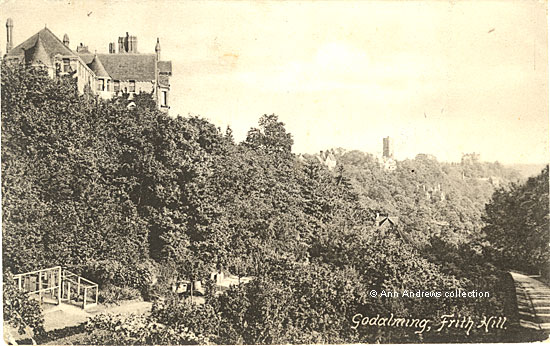| |
| Charterhouse Road, from Charterhouse Bridge. |
|
|
The above view was taken from the roadway on Charterhouse
bridge, looking downhill. It is either late nineteenth or early twentieth century. The land on the left hand
side immediately below the bridge belonged to Hodgsonites, one of the boarding houses for Charterhouse School in the
Frith Hill / Charterhouse Road area that was named after the Reverend James Thomas Hodgson M.A.[1]
The grounds included a fives court close to the bridge. The boarding house, together with the house and
garden we can see in the image, no longer exist and the land in this view has been used for more modern housing.
 See Hodgsonites See Hodgsonites
The Bargate stone wall on the right hand side of the road still borders the pavement today and the entrance about half
way down would have been for Lockites, another of the school's boarding houses. Lockites took its name from Sidney Wills
Lock, a mathematics master who had begun teaching at Charterhouse when it was based at Sutton's
Hospital in Charterhouse[2]. Lockites was also demolished and a new boarding house to
replace it was built within the school grounds. The original
entrance has been widened and now leads to the early 1980s
development of Chapel Fields. Weekites, next door, was demolished at the same time and is also part
of Chapel Fields as is a piece of ground that was once known as The Orchard.
This glimpse of the water tower on the corner of Knoll Road, which is on the skyline, cannot be seen today as very high hedging and trees obscure
the view. The water tower is even more visible in the 1895 picture below and the 1927 image at the bottom of the page.

1895 |
The message on the back of the second post card tells us that "the
house on the left is Hodgsonites and all below is Hodgsonites
garden". The garden is considerably fuller that it was
when the top picture was taken. The card was sent to his parents
by one of the pupils, Clement Edward John Gover, who was born
in 1891. His father was a vicar and Clement, who went on to
Pembroke College, Oxford, was to follow in his father's footsteps
after he left school. In 1911 Clement Gover, by this time a 20
year old theological student, was visiting Hodgsonites[3].
He was to enlist in World War One, becoming a Captain in the
Royal Army Chaplains Department. He fortunately survived the
conflict.

1927 |
The third view from the bridge shows us Hodgsonites' garage
block - there is a car behind the right hand door. Several
people can be seen in this photograph. A man in a cap is
close to the garage whilst another is tending Hodgsonites'
garden close to the neatly trimmed hedge. A woman is pushing
a perambulator up the road, something unthinkable today,
and three cyclists are coming up the hill behind her. There
is a steeply roofed building next to them, behind the wall,
though it is unclear what it was.
|
1. "Godalming". Published by A. Jury, 71, High Street,
Godalming. Printed in England. Not posted.
2. "Godalming, Frith Hill". F. Frith & Co.
Ltd., Reigate, No.36145. First published in 1895. Posted on
14 Oct 1906 in Godalming.
Postcard in the collection of, provided by and © Ann Andrews.
3. "Charterhouse Hill, Godalming". Published by F. Frith & Co.
Ltd., Reigate in 1927, No.79345. Printed in England. Unused.
Researched, written by and © Ann Andrews.
Intended for personal use only.
|
References:
[1] James Thomas Hodgson (1845-80),
a former pupil, was awarded his M.A. from Oxford. He was born
at Eton College and wrote a memoir of his father, Reverend
Francis Hodgson ("The Times", 27 November
1878). He was shown at Charterhouse in Kelly's 1878 Directory.
He died in Sussex.
[2] The 1881 census shows Sidney Willis
Lock living on Sandy Lane, later Charterhouse Road. He had been
awarded an M.A. by Caius College, Cambridge. Kelly's
1891 Directory gives his address as Woodcote, which was on Hindhead
Road (later Frith Hill Road). By the 1901 census he had moved
to Hove and was living at 2 Lansdowne Place.
[3] The 1911 census for England and
Wales is available on Find my Past. |
|
|